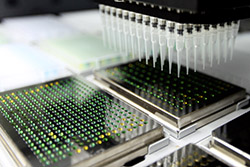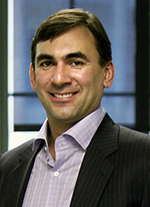
Milan Mrksich, PhD, professor in Cell and Molecular Biology, has created a tool and a startup company to measure enzyme reactions 100 times faster than a big pharmaceutical company can, let alone a few scientists in a lab.
The tool is called SAMDI, which stands for self-assembled monolayers desorption ionization. It can assess the biochemical activities of 100,000 compounds a day to see how thousands of proteins interact to make a cell function. With SAMDI, scientists can screen enzyme interactions to develop drugs. They can study how proteins function in organs to pinpoint disease risk. In a nutshell, the tool makes it possible to test unlimited biological reactions quickly and cheaply.
Mrksich is a biomedical engineer, chemical biologist and expert in nanotechnology and materials science. He’s also an entrepreneur with three startups on his résumé, the latest a technology company that runs tests using the SAMDI platform.
“The goal is to have SAMDI Tech serve the drug development industry by performing assay services and high throughput screening. In my own lab, we are using the SAMDI technology to get fundamental insights into the ways that normal and diseased cells differ,” said Mrksich, who holds joint appointments at Northwestern University’s Feinberg School of Medicine, McCormick School of Engineering and Weinberg College of Arts and Sciences.
Mrksich formed SAMDI Tech in 2011, the same year he joined Northwestern after 15 years at the University of Chicago. He earned his PhD in organic chemistry from the California Institute of Technology.

SAMDI is “label-free,” meaning compounds don’t need chemical additives like antibodies, fluorescent labels or radioactivity to mark a specific protein reaction. A robotic arm deposits proteins to tiny gold-surfaced circles on a metal plate and drops in a solution of interest. Afterward, a laser beam releases the molecules from the base and exposes the chemical reaction that occurred.
“We are now able to grow a cell culture, generate a lysate from those cultures and test the lysate for a broad range of enzyme activities. By comparing the patterns of activities in normal and diseased cells, we get clues as to what may drive disease and, in turn, what targets may be suitable for developing drugs against the disease,” said Mrksich, a member of the Robert H. Lurie Comprehensive Cancer Center of Northwestern University.
Mrksich spends about a third of his time on the Chicago campus, much of it collaborating with other Feinberg scientists.
“By having a lab downtown, my group can take our recent tools and apply them to exciting medical problems,” said Mrksich. “These are problems where an advance can translate into a huge impact for a patient population.”






